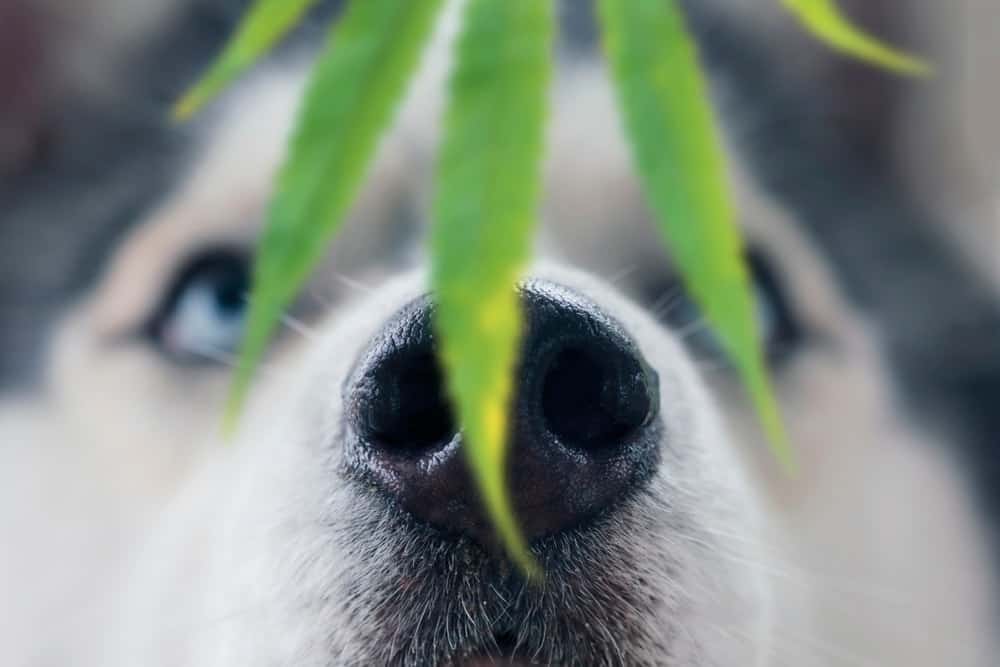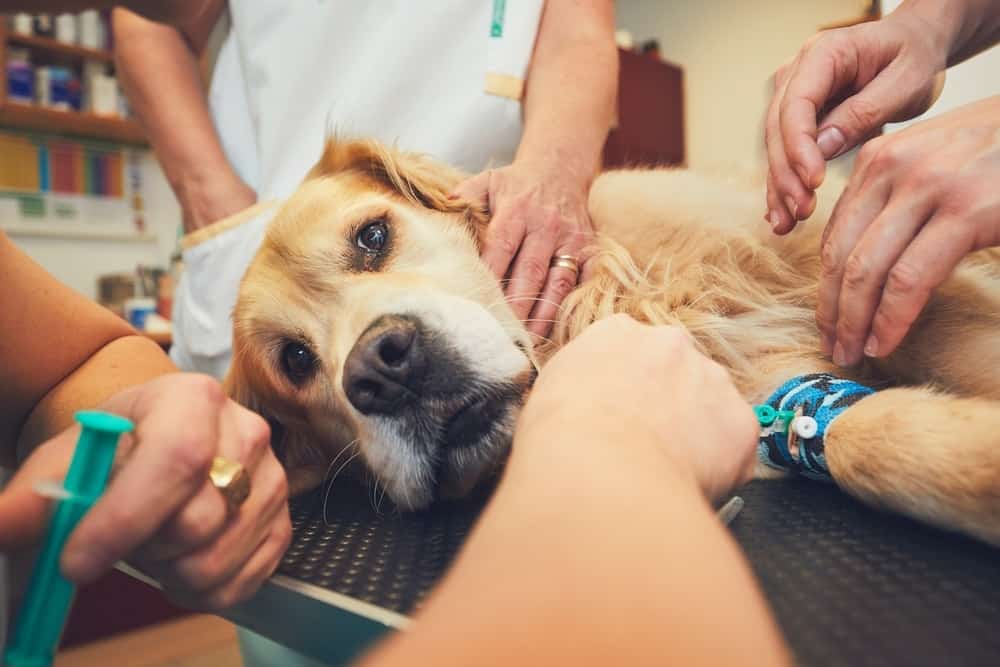“This post contains affiliate links, and I will be compensated if you make a purchase after clicking on my links.”
Dogs may not be as curious as cats are, but they’re just curious enough to check out anything in their path that doesn’t seem to belong, such as leftover cannabis edibles on the dinner table.
With the continued legalization of marijuana, it’s only a matter of time before weed products become common in every other household—and that will also increase the exposure of our canine friends to those products.
The last thing you want is for your pooch to accidentally eat marijuana. If that happens, you could be dealing with a severe medical (and probably also financial) emergency.

In this post, we’ll highlight what to do if your dog accidentally helps himself to weed, but first things first:
How Will Dogs Access Weed?
If you’re a cannabis consumer, the chances are that you already stock a variety of marijuana products. Without a proper storage plan for your marijuana products, it won’t be long before your dog sniffs out the product and snacks on it.
Another way your pooch could gain access to weed is if you cultivate cannabis at home. Many weed lovers prefer to grow marijuana plants in their backyards. But if such backyard gardens aren’t duly fenced off, dogs can venture into them and begin nibbling on the marijuana buds, flowers, or leaves.
Some dog owners may argue that fencing off their cannabis garden is an act in futility since dogs don’t eat plant matter. That’s a false assumption as it is common knowledge that dogs can snack on plants from time to time.
What Will Happen If Your Dog Eats Weed?
It’s important to note that more than 75% of a dog’s regular diet consists of animal protein, which implies that a dog’s digestive system isn’t used to processing plant matter.
So, the mere fact that weed is a plant means that ingesting it could expose your pooch to a wide range of gastrointestinal complications, such as;
- Nausea which leads to a loss of appetite
- Vomiting and diarrhea which lead to dehydration
- Abdominal pain
- Bowel and bladder incontinence
Besides the above gastrointestinal side effects, a dog may also exhibit the following symptoms from eating marijuana;
- Allergy-related symptoms, such as irritability, excessive scratching, runny eyes and nose
- Changes in body temperature (including alternating fever and chills)
- Changes in breathing patterns
- Elevated heart rate
- Generalized fatigue
- Incessant barking, howling, growling, or whining
- Dilated pupils and other forms of unusual eye movements
- Drooling
- Poor motor coordination, as is characterized by wobbliness
- Mental and neurological symptoms, such as seizures, tremors, hallucinations, and disorientation
While weed may not kill your dog immediately, according to veterinarians, if the above symptoms manifest themselves and go untreated for a prolonged duration, the dog may slip into a coma and eventually die.
What to Do If Your Dog Consumes Marijuana
1. Find Out the Quantity and Type of Weed That The Dog Has Consumed
It’s reasonably easy to estimate the amount of weed that a dog has eaten. In most cases, all you’ll need to do is compare the product’s quantity before and after the dog ate it. In the case of marijuana plants, you’ll assess the extent of the damage.
After establishing how much weed your dog has consumed, try to understand the individual compounds in the product. If the dog has ingested a cannabis edible, read the ingredients list to understand the active compounds in the product. For instance, marijuana products with high tetrahydrocannabinol (THC) will cause the dog more hallucinations, since THC is a psychoactive compound.
And if your canine friend has ingested cannabis plants, note the specific part of the plant consumed. According to experts, THC is usually concentrated in the flower buds and tiny leaves on top of the cannabis plant.
2. Monitor the Symptoms
Regardless of how much weed your dog has consumed or the specific cannabis compounds he has been exposed to, it’s important to keep an eye out for any symptoms. That’s because treatment for cannabis poisoning in dogs typically addresses the most severe symptoms.
We already highlighted some of the top symptoms of marijuana poisoning in dogs. However, there could be additional symptoms, depending on the toxicity of other non-cannabis ingredients in the product. This mostly applies to edible products.
For instance, chocolate is highly toxic to dogs due to theobromine and a chemical that’s relative of caffeine known as methylxanthine. Therefore, even if cannabis-infused chocolate contains fewer amounts of cannabinoids, the edible will likely make your dog sick.

3. Administer Emergency Treatments
If you notice any signs of cannabis toxicity in dogs, you should move with speed to administer emergency treatments. As we’ve already indicated, treatment options should address the symptoms.
For instance, you might consider offering your dog more water to counteract the effects of vomiting and diarrhea. Since the dog will likely have lost appetite, plain water won’t do here. Instead, offer your pet flavored fluids, such as broth.
Also, you can give the dog activated charcoal to prevent further toxicity. Once ingested, activated charcoal binds to food molecules in your dog’s stomach, preventing further absorption of toxic cannabinoids.
Most importantly, note that these are temporary measures that you only adopt while preparing to take the dog to the vet.
4. Visit the Vet
A visit to the vet is paramount, regardless of the quantity or type of weed your dog has consumed. The vet will scrutinize the dog’s condition and prescribe the right treatment option. If possible, carry the specific cannabis product that the dog consumed, which will help with diagnosis.
If the dog is visibly dehydrated, the vet may administer intravenous fluid therapy. Treatments will also focus on preventing the further reabsorption of toxins. To that end, the vet may induce vomiting using hydrogen peroxide or administer activated charcoal.
Even better, your vet will try to stabilize the dog’s cardiovascular system by normalizing the dog’s heart rate and breathing pattern. And at the end of the treatment, the vet will recommend a raft of measures to take to reduce future incidences of your dog’s exposure to weed products.
Cannabis toxicity in dogs is a severe problem. That’s because dogs have more cannabinoid receptors in their endocannabinoid system than humans, which makes them more sensitive to weed. Therefore, your best bet is to keep all weed products and plants out of bounds for your canine friends. But if your pooch sneaks up behind your back and consumes weed, visit the vet immediately.
Jeffery Thompson is a full-time content marketing specialist. He has been closely following the pet, CBD and Cannabis industry trends for quite some time. He has dabbled in various domains before the cannabis industry. On his off days, he likes to spend his time at the nearest animal shelter or nose deep in a book.


















